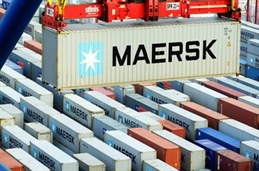
A.P. Moller – Maersk (Maersk) reported declines in both revenue and volumes for the first quarter as inventories remained high in major Western economies causing demand to fall and pushing freight rates lower.
Maersk reported that revenue declined by 26% to US$14.2 billion from US$19.3 billion — and EBITDA decreased to US$4.0 billion from US$9.1 billion weighed down by a sharp drop in freight rates and volumes.
EBIT during the period also dropped to US$2.3 billion from US$7.3 billion.
"The full-year guidance remains unchanged, with Q1 expected to be the strongest quarter of the year," Maersk said.
The Danish shipping line said the first quarter came "in line with expectations" amid continued destocking and easing of congestions which implied lower volumes across all segments.
"Radically changed" business environment
"We delivered a solid financial performance in a challenging market with lower demand caused by continued destocking. Visibility remains low for the remainder of the year and moving through this market normalisation, we remain focused on proactively managing costs," said Vincent Clerc, CEO of Maersk.
"As we adjust to a radically changed business environment, we continue to support our customers in addressing their supply chain challenges. We are pleased to note that customers continue to value the integrated logistics solutions and close partnership we provide," he added.
For the first quarter, ocean revenue decreased by US$5.7 billion to US$9.9 billion.
It said profitability for the quarter was significantly lower compared to Q1 2022, primarily due to lower freight rates and volumes, as demand softened.
Maersk noted, however, that proactive cost containment measures have been successful, and the Ocean contract negotiation season is "proceeding in line with expectations."
In Logistics & Services, revenue grew 21% to US$3.5 billion driven by the consolidation of acquisitions.
Organically, Q1 was affected by lower volumes caused by inventory corrections, especially with North American and European retailers, which was partially offset by new commercial wins. Additionally, underlying business performance was impacted by lower rates in Air Freight and weaker demand in e-commerce.
Volumes to "gradually pick up" in H2
In Terminals, Maersk said the top line was affected by lower volumes and storage income, both a factor of lower demand and the release of port congestion. Revenue in Terminals decreased to US$876 million from US$ 1.1 billion, but strong cost control contributed to continued solid financial performance in Terminals.
"Q1 was marked by continued destocking in Europe and especially North America. While it is difficult to predict the exact timing, Maersk expects volumes to gradually pick up in the second half of the year," the shipping line said.
For the rest of the year, Maersk noted that guidance remains unchanged.
"[It is] still based on the expectation that inventory correction will be complete by the end of H1, leading to a more balanced demand environment, that 2023 global GDP growth remains muted, and that the global ocean container market will grow in a range of -2.5% to +0.5%. Ocean expects to grow in line with the market," Maersk said.
In Q1 2023, A.P. Moller – Maersk said it also recognised US$374 million of the previously communicated US$450 million impairment and restructuring charge for the A.P. Moller – Maersk brands.



